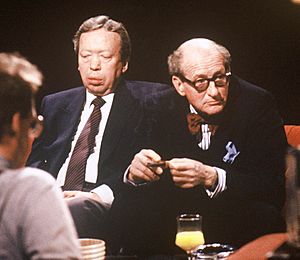Anthony Howard (journalist) facts for kids
Quick facts for kids
Anthony Howard
|
|
|---|---|

Appearing (left) with Lord Lambton on television programme After Dark in 1991
|
|
| Born |
Anthony Michell Howard
12 February 1934 London, England
|
| Died | 19 December 2010 (aged 76) London, England
|
| Alma mater | Christ Church, Oxford |
| Occupation |
|
| Years active | 1958–2005 |
| Employer |
|
| Spouse(s) |
Carol Anne Gaynor
(m. 1965) |
Anthony Michell Howard (1934–2010) was a famous British journalist, writer, and broadcaster. He was known for his work as an editor for magazines like New Statesman and The Listener. He also worked as a deputy editor for The Observer newspaper. Anthony Howard helped put together The Crossman Diaries, a book based on the notes of a government minister named Richard Crossman. He was awarded the CBE for his important work.
Contents
Anthony Howard's Early Life and Education
Anthony Howard was born in London, England, on February 12, 1934. His father, William Guy Howard, was a clergyman in the Church of England. Anthony went to several schools, including Westminster School and Christ Church at the University of Oxford. At Oxford, he studied law. While at university, he was very active in student politics. In 1954, he led the Oxford University Labour Club, and the next year, he was the President of the Oxford Union, a famous debating society.
After university, Anthony planned to become a lawyer. He even qualified to practice law in 1956. However, he also had to complete his National service in the army. During this time, he was involved in the Suez Crisis, a conflict in 1956. He wrote articles about his experiences for the New Statesman magazine. These articles were unsigned, meaning his name wasn't on them, but they almost got him into trouble with the army!
Starting His Journalism Career
Even though he wrote articles during his army service, Anthony Howard didn't plan to be a journalist at first. But in 1958, he "stumbled" into the job. He started as a political reporter for Reynolds News. In 1959, he moved to Manchester Guardian, another well-known newspaper.
In 1960, he received a special scholarship called a Harkness Fellowship to study in the United States. He stayed on the Guardian staff while he was there. From 1961 to 1964, he was the political reporter for the New Statesman. He really admired Hugh Gaitskell, who was the leader of the Labour Party at the time. Anthony believed strongly that people should be able to choose their own leaders. He once said he was upset when Alec Douglas-Home became the leader of the Conservative Party, calling it an "Etonian fix" arranged by Harold Macmillan.
In 1965, Anthony joined The Sunday Times as their Whitehall correspondent. This meant he reported on the activities of senior government officials. He felt this was a new way of doing journalism. The Prime Minister at the time, Harold Wilson, told his staff not to work with Anthony. Wilson was known for liking secrecy and worried that Anthony's reporting might help his enemies.
Anthony Howard then became the chief reporter in Washington for The Observer newspaper, from 1966 to 1969. He also often contributed to The World at One on Radio 4. He even said he was "almost the World at One Washington correspondent."
Becoming an Editor
Anthony Howard became the editor of the New Statesman magazine in 1972, taking over from Richard Crossman. He had been Crossman's deputy editor before that. As editor, he hired many talented writers, including Robin Cook, James Fenton, Christopher Hitchens, and Martin Amis. He also published a rare article by a non-British writer, Gabriel García Márquez, about the overthrow of the government in Chile.
He also featured articles that criticized the British Left, written by his friend and former editor of the magazine, Paul Johnson. Despite his efforts, the magazine's sales continued to drop. After leaving the New Statesman, he edited The Listener for two years, from 1979 to 1981.
From 1981 to 1988, Anthony was the deputy editor of The Observer. There, he helped a young journalist named Robert Harris, who later became a famous novelist. Their working relationship eventually ended because of disagreements about the newspaper's owner, Tiny Rowland, possibly interfering with the news.
After leaving The Observer, Anthony worked as a reporter for TV shows like Newsnight and Panorama from 1989 to 1992. He had also hosted Face the Press on Channel Four earlier.
Later Career and Legacy
Anthony Howard's last jobs as an editor were at The Times newspaper. He was the Obituaries editor (meaning he wrote about people who had died) from 1993 to 1999. He was also the chief reviewer for political books from 1990 to 2004. He continued to write opinion columns for the newspaper until 2005.
He helped his friend Michael Heseltine write his autobiography, Life in the Jungle, which came out in 2000. Anthony also wrote an official biography of Basil Hume, a famous cardinal, called Basil Hume: The Monk Cardinal in 2005.
Anthony Howard married Carol Anne Gaynor, who was also a journalist, in 1965. He lived in London and Ludlow. He passed away in London on December 19, 2010, at the age of 76. He died from problems after surgery for an aneurysm, which is a weak spot in a blood vessel.
Since 2013, there has been an award called the Anthony Howard Award. It gives young journalists a chance to work for six months on the politics desks of The New Statesman and The Times, continuing Anthony's legacy in journalism.
 | Mary Eliza Mahoney |
 | Susie King Taylor |
 | Ida Gray |
 | Eliza Ann Grier |

